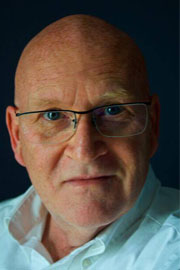Category: Uncategorised
I struggled with it. Yesterday, when the flow was right and each letter appeared to be falling into the correct order, and as each word seemed to propel me along, I stopped.
A dead stop, an unmitigated stop. An unintended stop; it was more than a pause, more than a period.
A stop, a full stop; a debilitating stop.
One word
.
One word was all that was stopping me from continuing with a deeply personal poem I’d been working on. It was a one-syllable word at that.
I didn’t want to use it.
I searched for alternatives, but nothing else worked. Not one other word, or a series thereof, could substitute for the word I had used. No other word could convey the rage, or the frustration, in the exact way this word did.
Fuck.
The F word: it’s one of those words. It’s one of those words that traditionally raise eyebrows. It’s one of those words you are told, as a kid, you shouldn’t say. It was a bad word. I remember my brother said, “fuck”, one time, in the company of my parents. It was the only time. I recall Mom’s eyes bugging out, and Dad always had that look when he turned angry. I learned then I wasn’t going to make the same mistake, ever. Fuck, no way.
Yes, its one of those words, one of those fucking words there are really no replacements for, certainly in certain circumstances and depending, of course, on its usage. Check your thesaurus; in many or most (probably all) there are no offerings. I’ve got Roget’s Super Thesaurus 4th Edition on my desk, and it’s not in there. It’s not even offered as a synonym under ‘intercourse’ (which casts doubt upon the book jacket’s “Amazingly Comprehensive” claim).
I don’t use it often, not as often as I should or feel like (more in dialogue than description), and it really has lost its shock appeal; you hear it often in movies and music.
It’s one of those words.
It’s one of those words that has been censored, avoided, painted over, hushed, and stifled for generations. It still appears on public broadcaster’s list of words you cannot say on the airwaves. It’s one of those words that will get bleeped out. It’s one of those words that would get your mouth washed out with soap, or get you sent to the principal’s office. It’s a bad word.
It’s one of those words there are no real replacements for, like ‘peace’ (and I realize the folks at Roget have listed a handful of options for this word but, when you think about it. there are no synonyms, not in the true sense of the word).
Now fuck is in the dictionary, noun and verb (Oxford here). ‘Sexual intercourse’, ‘mess about’, ‘fool around’, and, ah, there it is: ‘expressing anger’ (I knew it fit into what I was writing). It’s no longer listed as slang, as it once was, but it is listed as “A highly taboo word.”
Come on, fuck off: “highly taboo”?
It might have been taboo, at one time, like even before my Grandparents were procreating. Yes, there are times when the word just doesn’t seem appropriate (but they did, by my calculation at least four times), but these days most everybody uses the word, from politicians to sweet little Grade 3 students, and their mothers.
You hear it all the time; sometimes it is not well used, and other times it is placed properly. A lot of times it’s as common as ‘um’ or ‘uh’ or ‘like’, like, you know, like, like that (and I’m sure you do).
It is a word that means so much, and can say so much. It is a word like love (and if you love, you are probably going to fuck, but you don’t have to love to fuck then it’s just sex and if it’s just sex then you are going to fuck a lot . . . but I digress).
I’ve heard fuck described as the Swiss Army Knife of words: a word for all purposes (perhaps not all occasions). It’s so utilitarian, with many functions. It describes rage (fuck you) and joy or happiness (fuck yeah), sheer disappointment (oh fuck), sexuality and sensuality (depending on the accent), be it a mistake or a misfit (fuck up), and for a one-syllable word there are so many inflections which make it sound bigger.
It is a useful word, in the right circumstances, and it is a wholeheartedly purposeful word.
Fuck is a great curse word. It could, or can I suppose, be a hurtful word. But there are many and more hateful words in the vernacular that are publicly acceptable and are used far too often. I can think of words associated with any of the isms (racism, sexism, fascism, capitalism) that I find more offensive, and you can say those words on television and get away with it (it still doesn’t make it right).
It should probably be used more than it is, but it may never be. There are far too many stigmas, stereotypes and old wives tales that will continue to silence the word. Sadly. This world has made progress in so many ways. Times have changed: women can vote (at least on my continent), my gay friends can marry, and even prime time television images can graphically illustrate the actions involved when fucking (they just can’t show certain parts).
Still you can’t say fuck, not everywhere, not when you want to or need to. Not always. It’s a bad word. Fuck.
But yesterday, despite my best efforts to find another, it was a good word.
It was the right word.
Fuck yeah.
Posted on February 25, 2015 by j.g.lewisLeave a comment“When you want to hurry something, that means you no longer care
about it and you want to get on to other things.”
– Robert M. Pirsig
I’ve been re-reading Persig’s Zen and The Art of Motorcycle Maintenance over the past couple of months. I breezed through it the first time, but now I’m reading slowly and paying more attention.
A newsroom colleague lent me the book in the decade after it was published, and some of Pirsig’s philosophies have struck a chord in the years since. The 40-year-old book is based around a journey (aren’t all stories, really?) but just as the author states; the book actually has little to do with maintaining a motorcycle and even less with Zen Buddhism.
The book explores society’s relationship with each other, with technology, self-satisfaction and Persig’s profound philosophies on life’s fundamental questions.
An engaging book, I first read it over a weekend and many of the ideals have come back at certain points in my life. Persig speaks of quality, and how to mindfully squeeze more out of your life. It’s ironic, however, that when I first read the book I missed the lesson quoted above. I was hurrying through the book. Decades later I realize I may have not absorbed one of the greatest lessons in the pages.
Much of my life has been chronic hurry. I’m not sure when it started, or why it continued, but I have spent a lot of time rushing to meet deadlines or obligations, to reach my next goal, to get something done, or to be somewhere. In my early years it was keeping up with the latest trends, or getting to the next party or happening. Later it was rushing to the next appointment, or the next city.
I know it’s not just me. I think we, as a society, have developed into a culture of hurry. Multi-tasking is part of our daily dialogue and the introduction and rapid advancement of technologies has enabled us to do more and see more, at the same time. Along with this progress we have heaped expectations onto ourselves, as have others.
As a result, more often than not, it feels like we are always rushing.
We are continually off to meetings, to dinner, to work, to the theatre; we always seem to be hurrying. Commerce and capitalists embraced this change and have created ways that allow us to do whatever we could before, but quicker now with express lanes, drive-in restaurants, and online banking and shopping. It is, apparently, called convenience, as much as it is called progress.
We take on more work, because apparently we can. And we hurry.
‘Hurry’ is described by Oxford as moving or acting with great or undue haste. All of us have become hasty; we rush to get the job done.
Look at your work at the office; was it completed accurately, thoroughly, and properly, as you multi-tasked your way through the allotted time? Were you getting the job done, or just getting through the day? Did you care about the work you were producing, or just the next task on your agenda?
As our professional lives creep into our personal lives in this imbalanced work/life balance, we take the attributes of hurry along with us. Did you care about the meal you prepared after speeding home from the workplace, or did you rush it?
You know what it’s like to hurry a meal, to sit at the dinner table and discover a little too much pink in the meat, or too much bone in the broccoli. Or, more so, you arrive home hungry after battling rush-hour traffic and don’t even bother preparing the nutritious meal you were planning. Instead you zap one of those microwave entrees designed for people in a hurry, or you take only the time to boil water for your instant noodles. Even then you rush through the chore because you had other things to do, or things you thought could be done at the same time.
In the process you hurried through both tasks. Did you care about either? Really?
As we hurry we learn shortcuts that allow us to keep up the frenetic pace, like ironing only the collar and front of the shirt (you’re wearing a blazer anyway). But like that shirt, the job is never really complete. Take off the jacket and you will see the wrinkles of a job done poorly.
There is no efficiency in hurrying. Still it is expected of us: at work, at home, by ourselves, and in life in general.
I’ve hurried through preparation and presentations, relationships, and lunches with friends, all with the perception that I had something else or something better to do. I’ve also hurried to pack for a business trip only to discover half of my wardrobe was left hanging in the closet or at the dry cleaners.
How efficient was my hurry? I’m reminded of a bumper sticker (or coffee mug) I saw years ago: ‘The hurrier I go, the behinder I get.’
Whatever happened to patience, to persevering through the pain and annoyance and even the mundane tasks to arrive at satisfaction in what you were doing?
I used to think patience meant slowing down, but that is not the case. It’s about taking the right amount of time to do the task right. I’ve hurried through manuscripts; I wrote in a hurry, I edited in a hurry, and I submitted in a hurry. It’s not that the work wasn’t good . . . it just wasn’t good enough.
Hurrying is not economical. You spend more money on gas, on food, on your clothing. You misuse your energy. When you hurry you make financial decisions that will plague you for years. A split-second decision can disrupt, even kill, relationships. How many times have we heard the idiom ‘haste makes waste’?
I’ve been trying, over the past couple of years, to find and implement my patience. It has been trying because you need to unlearn and relearn what it is you do, and what it is you want. You have to cultivate patience, and you have to allow it the proper time.
Patience comes from within; it must be nurtured, it must be respected, and it must confront all the hurry that is imposed on us. Patience is not always there. As I write this I’m trying not to hurry to meet a self-imposed deadline. Still I keep trying to have more patience with myself, as I take the time to plan and organize (and not hurry though the process). I try not to think of what comes next.
I try to care. I try not to hurry.
Most times our lives are hectic and hurried. Does that mean we no longer care about how we are living? I hope not, because there is only one option to living, and I’m in no hurry to do that.
Posted on February 18, 2015 by j.g.lewis // 1 Comment
Lifeless mitten lays in wait. Abandoned, stiff
atop a crunchy snow bank. The sidewalk
passes by, unknowing. Throbbing red fingers,
a child’s frostbitten hand, shiver beneath a
coat sleeve. Somewhere. Seeking warmth,
comfort against winter’s harsh reality.
Unclaimed. A mitten separated from its
purpose. We all, young and older, leave
pieces of ourselves scattered throughout time.
Paperbacks, pens, sunglasses, yoga mats,
carelessly or accidentally discarded.
A laundromat sock with no mate.
Possessions or promises, more lost
than found. Feelings, emotions cast
astray. Hopelessly lost. A lone mitten,
pieces of ourselves. Where do we
go when a bit of us is missing, when
our purpose is unrealized?
Where then, when we seek warmth.
are we? Waiting to be reunited with
missing parts? Another hand to hold?
Another day. Our fingers still numb, the
lone mitten still there. The sidewalk
passes by. We remain incomplete.




